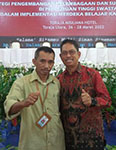Akuatikisle: Jurnal Akuakultur, Pesisir dan Pulau-Pulau Kecil
Full Length Article
The level of viability of milkfish (Chanos chanos) in transportation containers with different temperatures
Highlights
Generate NLP AI by Wizdam ID.
Abstract
The transportation of milkfish (Chanos chanos) is an important factor determining the survival of milkfish (Chanos chanos). The hatchery is not always close to the location of the aquaculture pond, so the treatment in transportation using land and sea vehicles to arrive at the aquaculture site/pond. This study aims to determine the effect of different temperatures in milkfish (Chanos chanos) transportation to obtain a good temperature in milkfish (Chanos chanos) transportation. The research method uses a completely randomized design (CRD) with three treatments and three replications. The treatments given were treatment A (temperature 15oC), treatment B (temperature 18oC), and treatment C (temperature 21oC). While the time taken for each treatment is 14 hours. The results showed that the survival of milkfish (Chanos chanos) were in the range of 90.04% (treatment A), 95.04% (treatment B), and 88.67% (treatment C), where the highest survival in treatment B is 95.04%.
Keywords
Introduction
Section snippets
Material and Methods
Materials and methods from the full-text PDF of this article cannot be displayed.
Results
Results from the full-text PDF of this article cannot be displayed.
Discussion
Discussion from the full-text PDF of this article cannot be displayed.
Conclusions
Conclusions from the full-text PDF of this article cannot be displayed.
Acknowledgment
Acknowledgment from the full-text PDF of this article cannot be displayed.
Competing interest
The authors declare that they have no known competing financial interests or personal relationships that could have appeared to influence the work reported in this paper.
Conflict of interest
The authors declare that the research was conducted in the absence of any commercial or financial relationships that could be construed as a potential conflict of interest.
Ethical approval acknowledgements
No ethical approval required for this article. All procedures followed were in accordance with the ethical standards of the responsible committee on human experimentation (institutional and national) and with the Helsinki Declaration of 1975, as revised in 2008 (5)
Supplementary files
Data sharing not applicable to this article as no datasets were generated or analysed during the current study, and/or contains supplementary material, which is available to authorized users.
Bibliographic Information
Cite this article as:
-
Submitted
2 November 2018 -
Revised
13 November 2018 -
Accepted
18 November 2018 -
Published
25 November 2018 -
Version of record
25 November 2018 -
Issue date
1 December 2018
-
Academic subject
Aquaculture; Fisheries Science
Keywords
Copyright
Copyright © 2018 Fendi, Sarfiani, Karyawati, Rochmady, Abdul Rakhfid. Sangia Research Media and Publishing. Production and hosting by Sangia (SRM™).  This work is licensed under a Creative Commons Attribution-ShareAlike 4.0 International License.
This work is licensed under a Creative Commons Attribution-ShareAlike 4.0 International License.
Disclaimer: All claims expressed in this article are solely those of the authors and do not necessarily represent those of their affiliated organizations, or those of the publisher, the editors and the reviewers. Any product that may be evaluated in this article or claim that may be made by its manufacturer is not guaranteed or endorsed by the publisher.
Comments on this article
By submitting a comment you agree to abide by our Terms and Community Guidelines. If you find something abusive or that does not comply with our terms or guidelines please flag it as inappropriate.




